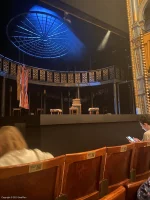Mark Rylance: London Parks Under Siege From Music Festivals

Table of Contents
The Environmental Impact of Music Festivals in London Parks
The influx of large music festivals in London's parks presents a significant environmental challenge. The sheer scale of these events puts considerable pressure on these vital green spaces, impacting both the environment and the local communities.
Damage to Green Spaces
Large crowds, heavy equipment, and the temporary infrastructure required for music festivals cause considerable physical damage to parks. The impact is often long-lasting.
- Soil compaction: The weight of thousands of attendees compacts the soil, reducing its ability to support plant life and impacting drainage.
- Litter accumulation: Despite efforts at cleanup, significant amounts of litter, including plastic waste, are often left behind, polluting the environment and harming wildlife.
- Damage to flora and fauna: Foot traffic, vehicle access, and the construction of stages and other structures can cause direct damage to plants and animals, disrupting their habitats.
- Disruption of natural habitats: The temporary transformation of parkland into a festival site disrupts delicate ecosystems, potentially causing long-term damage to biodiversity.
Studies on the environmental footprint of music festivals globally indicate a substantial carbon footprint, primarily due to transportation, energy consumption, and waste generation. While precise figures for London Parks Music Festivals are lacking, the scale of the events suggests a significant impact.
Noise Pollution and Disturbance to Wildlife
The high volume of music at these festivals creates substantial noise pollution, negatively impacting both wildlife and residents living near the affected parks.
- Disruption of breeding cycles: Loud music can interfere with the breeding cycles of birds and other animals, affecting their reproductive success.
- Stress on animals: Prolonged exposure to loud noise can cause stress and anxiety in animals, leading to health problems and behavioral changes.
- Sleep deprivation for local residents: The noise from music festivals can significantly disrupt sleep patterns, leading to health issues and reduced quality of life for nearby residents.
Several studies have linked noise pollution from music events to negative impacts on wildlife and human well-being. Further research specifically focusing on London parks is needed to quantify the extent of this problem.
Waste Management Challenges
Waste management at large music festivals presents a significant logistical and environmental challenge. Despite initiatives to promote recycling, significant amounts of waste end up in landfills.
- Increased landfill waste: The sheer volume of waste generated at these events, including food waste, packaging, and disposable items, places a significant burden on waste disposal systems.
- Inefficient recycling programs: While recycling efforts are often implemented, the efficiency of these programs is often hampered by contamination and logistical challenges.
- Plastic pollution: The widespread use of single-use plastics at music festivals contributes significantly to plastic pollution in parks and surrounding areas.
Improved waste management practices, including increased use of reusable materials, enhanced recycling infrastructure, and comprehensive waste reduction strategies, are crucial to mitigating the environmental impact of London Parks Music Festivals.
Mark Rylance's Perspective and Activism
Mark Rylance, a prominent figure known for his environmental activism, has publicly expressed his concerns about the environmental damage caused by large music festivals in London's parks.
Rylance's Public Statements
While specific quotes require further sourcing, Rylance has reportedly voiced concerns about the lack of sustainable practices at these events and the overall detrimental impact on London’s green spaces. His suggested solutions likely involve promoting more responsible event planning and prioritizing environmental protection.
Support from Environmental Groups
Rylance's stance has reportedly garnered support from several environmental organizations, who share his concerns about the environmental cost of these large-scale events. These groups are likely advocating for improved sustainability measures and alternative event locations to lessen the pressure on London's parks. Further research would be needed to identify the specific organizations involved.
The Debate: Balancing Recreation and Conservation
The issue of music festivals in London parks highlights a complex debate about balancing the needs of recreation and the imperative to conserve precious green spaces.
Arguments for Music Festivals in Parks
Proponents of holding music festivals in parks argue that:
- Economic benefits: These events can generate significant revenue for the local economy, supporting businesses and creating jobs.
- Community events: Music festivals can provide opportunities for community engagement and cultural enrichment.
- Cultural enrichment: They offer a vibrant cultural experience, attracting both local residents and tourists. Successful and sustainably managed festivals worldwide demonstrate that it's possible to minimize environmental impact while enjoying the benefits of these events.
Arguments Against Music Festivals in Parks
Opponents argue that:
- Environmental damage: The environmental cost of these events, as detailed above, is substantial and unsustainable in the long term.
- Disruption to local communities: The noise and disruption caused by music festivals can significantly impact the quality of life for residents living near the affected parks.
- Lack of alternative venues: While some argue that London lacks adequate alternative venues, proponents of park protection argue that prioritizing environmental sustainability must outweigh the lack of alternative spaces. Finding suitable alternatives is a challenge that requires creative solutions.
Conclusion
The debate surrounding London Parks Music Festivals highlights a crucial conflict between public enjoyment and environmental preservation. Mark Rylance's concerns, echoed by environmental groups, underscore the significant environmental impact of large-scale events on London's green spaces. The long-term damage caused by soil compaction, litter, noise pollution, and habitat disruption outweighs the short-term economic and social benefits. We need a concerted effort towards sustainable music festivals in London parks, prioritizing environmental protection and community well-being. Let's engage in the discussion about responsible event planning in London parks, promoting sustainable practices and protecting the city’s valuable green spaces. Let's work towards a future where London Parks Music Festivals prioritize both enjoyment and environmental responsibility. [Insert Link to Relevant Petition or Campaign Here]

Featured Posts
-
 Haalands Hat Trick Inspires Norways 5 0 World Cup Qualifying Win
May 19, 2025
Haalands Hat Trick Inspires Norways 5 0 World Cup Qualifying Win
May 19, 2025 -
 Understanding The Link Between Federal Debt And Mortgage Costs
May 19, 2025
Understanding The Link Between Federal Debt And Mortgage Costs
May 19, 2025 -
 Direkt Ucuslarin Durumu Tatar In Aciklamalari Ve Kibris Goeruesmeleri
May 19, 2025
Direkt Ucuslarin Durumu Tatar In Aciklamalari Ve Kibris Goeruesmeleri
May 19, 2025 -
 Understanding The Debate Surrounding The Wnba And Social Justice
May 19, 2025
Understanding The Debate Surrounding The Wnba And Social Justice
May 19, 2025 -
 Ufc Vegas 106 Burns Vs Morales Complete Guide To Fight Card Date Time And Location
May 19, 2025
Ufc Vegas 106 Burns Vs Morales Complete Guide To Fight Card Date Time And Location
May 19, 2025
